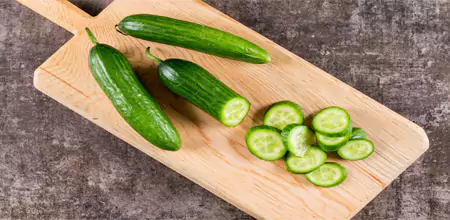The Ultimate Guide to Cucumbers: Nutrition, Benefits, and Uses
Cucumbers (Cucumis sativus) are one of the most refreshing and versatile vegetables in the world. From salads and pickles to skincare and hydration, their uses span culinary and wellness traditions across cultures. This comprehensive guide explores everything you need to know about cucumbers — their history, nutritional value, health benefits, varieties, growing tips, and delicious recipes.
1. A Brief History of Cucumbers
Cucumbers have been cultivated for over 3,000 years, originating in South Asia, particularly in the region that is now India. Ancient civilizations, including the Egyptians, Greeks, and Romans, prized cucumbers for their refreshing taste and cooling effect. Roman Emperor Tiberius is famously said to have eaten cucumbers every day, using special growing techniques to ensure year-round availability.
2. Nutritional Profile
Despite being low in calories, cucumbers pack a surprising nutritional punch. They are composed of about 95% water, making them an excellent choice for hydration. A typical 100-gram serving contains:
- Calories: 15 kcal
- Water: 95%
- Carbohydrates: 3.6 g
- Fiber: 0.5 g
- Protein: 0.6 g
- Vitamin C: 4% of the daily value
- Vitamin K: 16% of the daily value
- Potassium: 4% of the daily value
- Magnesium, manganese, and small amounts of other micronutrients
3. Health Benefits
Including cucumbers in your diet can offer numerous health advantages:
- Hydration: The high water content supports hydration, especially in hot climates.
- Weight Management: Low calorie and high water content make them an ideal snack for weight-conscious individuals.
- Antioxidant Properties: Contain compounds like beta-carotene and flavonoids that help fight free radicals.
- Digestive Support: The fiber content promotes healthy digestion.
- Heart Health: Potassium and magnesium contribute to blood pressure regulation.
4. Different Types of Cucumbers
There are many cucumber varieties, each suited to different uses:
- Slicing Cucumbers: Large, thick-skinned cucumbers commonly sold in supermarkets.
- Pickling Cucumbers: Smaller with thinner skin, perfect for pickling.
- English Cucumbers: Long, seedless, and wrapped in plastic to maintain freshness.
- Persian Cucumbers: Smaller, tender-skinned, and often eaten whole.
- Gherkins: Tiny cucumbers often preserved in vinegar or brine.
5. Culinary Uses
Cucumbers shine in both raw and cooked dishes:
- Salads: Freshly sliced cucumbers add crunch and freshness.
- Pickles: Preserving cucumbers in vinegar or brine creates tangy snacks.
- Soups: Cold cucumber soups, like gazpacho, are refreshing summer dishes.
- Smoothies: Blending cucumbers with fruits and herbs adds a hydrating twist.
- Garnishes: Cucumber slices are popular in drinks and as decorative plating elements.
6. How to Grow Cucumbers
Cucumbers thrive in warm weather and plenty of sunlight. Here’s a quick guide:
- Planting Season: Late spring to early summer.
- Soil: Well-draining, rich in organic matter.
- Watering: Keep soil moist but not waterlogged.
- Support: Use trellises for vine varieties to save space and improve air circulation.
- Harvesting: Pick when firm and the desired size; overripe cucumbers can taste bitter.
7. Storage Tips
To keep cucumbers fresh:
- Store whole cucumbers in the refrigerator crisper drawer.
- Wrap in a paper towel and place in a plastic bag to prevent excess moisture.
- Use within a week for best flavor and texture.
8. Fun Facts About Cucumbers
- Cucumbers belong to the same plant family as melons and pumpkins (Cucurbitaceae).
- They have been used in skincare for centuries to reduce puffiness and refresh skin.
- The longest cucumber recorded measured over 3 feet (91 cm) in length.
9. Simple Cucumber Recipes
Refreshing Cucumber Salad
Ingredients: Cucumbers, red onions, olive oil, lemon juice, salt, pepper.
Method: Slice cucumbers and onions, toss with olive oil and lemon juice, season, and serve chilled.
Cucumber Mint Smoothie
Ingredients: Cucumbers, mint leaves, honey, yogurt, ice.
Method: Blend all ingredients until smooth. Enjoy cold.
Conclusion
Cucumbers are more than just a salad filler — they’re a powerhouse of hydration, nutrients, and culinary versatility. Whether eaten fresh, pickled, or blended into drinks, they are a staple that fits into almost any diet and lifestyle.
